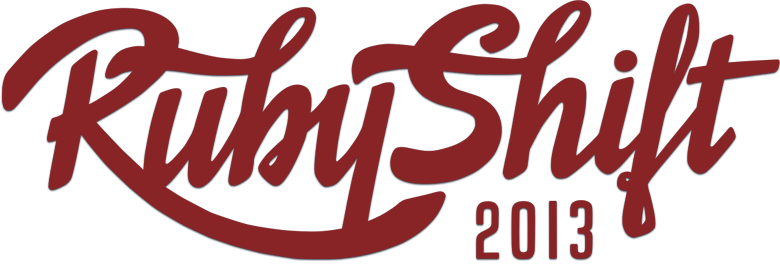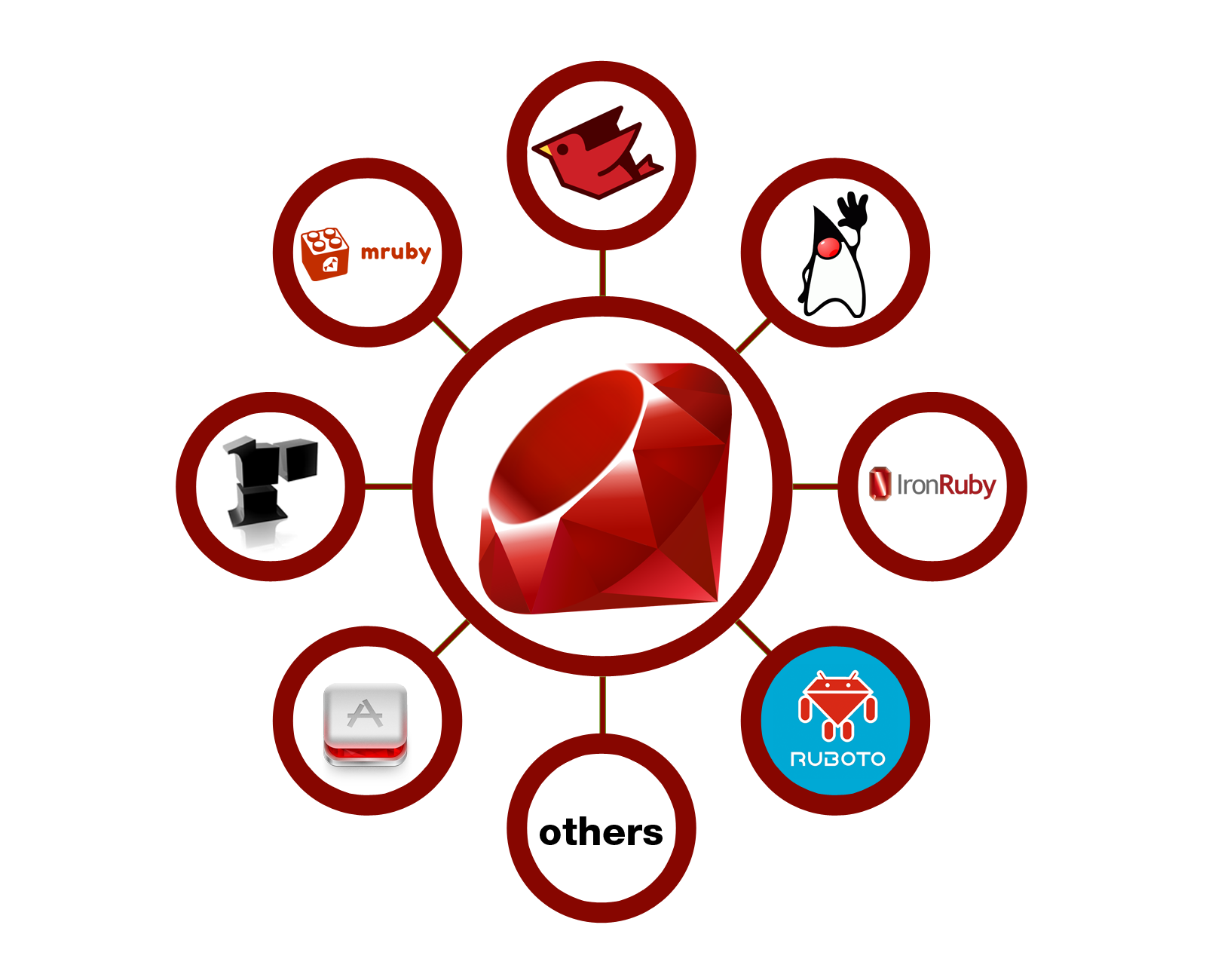

Ruby is awesome!

Ruby Infrastructure

Golang

Golang
- A better C (2 compiler (gc, gcc), one interpreter)
- Memory management is handled for you, but don’t be wreckless
- Explicit is better than implicit
- Rich built-in functionality
- Fast.. everything (from compilation to execution)
- Concurrency built-in and made easy
- Documentation is critical
- And ... nothing new

Although we expected C++ programmers to see Go as an alternative, instead most Go programmers come from languages like Python and Ruby. Very few come from C++.
Python and Ruby programmers come to Go because they don't have to surrender much expressiveness, but gain performance and get to play with concurrency.
Hello, RubyShift!
Golang
package main
import (
"fmt"
)
func main() {
fmt.Println("Привет, RubyShift!")
}
Hello, HTTP/1.1 RubyShift!
Golang
package main
import (
"net/http"
"fmt"
)
func HelloServer(w http.ResponseWriter, req *http.Request) {
fmt.Fprint(w, "Привет, RubyShift!")
}
func main() {
http.HandleFunc("/", HelloServer)
http.ListenAndServe(":6789", nil)
}
A quick introduction
Golang
Packages, imports and exported names
A quick introduction
package main
import (
"fmt"
"math/rand"
)
func main() {
fmt.Println("My favorite number is", rand.Intn(10))
}
Basic types
A quick introduction
- bool
- string
- int int8 int16 int32 int64
- uint uint8 uint16 uint32 uint64 uintptr
- byte // alias for uint8
- rune // alias for int32, represents a Unicode code point
- float32 float64
- complex64 complex128
- bool
package main
import (
"fmt"
"math/cmplx"
)
var (
ToBe bool = false
MaxInt uint64 = 1<<64 - 1
z complex128 = cmplx.Sqrt(-5 + 12i)
)
func main() {
const f = "%T(%v)\n"
fmt.Printf(f, ToBe, ToBe)
fmt.Printf(f, MaxInt, MaxInt)
fmt.Printf(f, z, z)
}
Structs
A quick introduction
package main
import "fmt"
type Vertex struct {
X int
Y int
}
func main() {
fmt.Println(Vertex{1, 2})
}
Pointers
A quick introduction
package main
import "fmt"
type Vertex struct {
X int
Y int
}
func main() {
p := Vertex{1, 2}
q := &p
q.X = 1e9
fmt.Println(p)
}
Slices
A quick introduction
package main
import "fmt"
func main() {
p := []int{2, 3, 5, 7, 11, 13}
fmt.Println("p ==", p)
for i := 0; i < len(p); i++ {
fmt.Printf("p[%d] == %d\n",
i, p[i])
}
}
Maps
A quick introduction
package main
import "fmt"
type Vertex struct {
Lat, Long float64
}
var m map[string]Vertex
func main() {
m = make(map[string]Vertex)
m["Bell Labs"] = Vertex{
40.68433, -74.39967,
}
fmt.Println(m["Bell Labs"])
}
Interfaces
A quick introduction
package main
import (
"fmt"
"math"
)
type Abser interface {
Abs() float64
}
func main() {
var a Abser
f := MyFloat(-math.Sqrt2)
v := Vertex{3, 4}
a = f // a MyFloat implements Abser
a = &v // a *Vertex implements Abser
a = v // a Vertex, does NOT
// implement Abser
fmt.Println(a.Abs())
}
type MyFloat float64
func (f MyFloat) Abs() float64 {
if f < 0 {
return float64(-f)
}
return float64(f)
}
type Vertex struct {
X, Y float64
}
func (v *Vertex) Abs() float64 {
return math.Sqrt(v.X*v.X + v.Y*v.Y)
}
Errors
A quick introduction
package main
import (
"fmt"
"time"
)
type MyError struct {
When time.Time
What string
}
func (e *MyError) Error() string {
return fmt.Sprintf("at %v, %s",
e.When, e.What)
}
func run() error {
return &MyError{
time.Now(),
"it didn't work",
}
}
func main() {
if err := run(); err != nil {
fmt.Println(err)
}
}
Goroutines
A quick introduction
package main
import (
"fmt"
"time"
)
func say(s string) {
for i := 0; i < 5; i++ {
time.Sleep(100 * time.Millisecond)
fmt.Println(s)
}
}
func main() {
go say("world")
say("hello")
}
Channels
A quick introduction
package main
import "fmt"
func sum(a []int, c chan int) {
sum := 0
for _, v := range a {
sum += v
}
c <- sum // send sum to c
}
func main() {
a := []int{7, 2, 8, -9, 4, 0}
c := make(chan int)
go sum(a[:len(a)/2], c)
go sum(a[len(a)/2:], c)
x, y := <-c, <-c // receive from c
fmt.Println(x, y, x+y)
}
Select
A quick introduction
package main
import "fmt"
func fibonacci(c, quit chan int) {
x, y := 0, 1
for {
select {
case c <- x:
x, y = y, x+y
case <-quit:
fmt.Println("quit")
return
}
}
}
func main() {
c := make(chan int)
quit := make(chan int)
go func() {
for i := 0; i < 10; i++ {
fmt.Println(<-c)
}
quit <- 0
}()
fibonacci(c, quit)
}
GO and Web
Golang
HTTP Server
GO and Web
package main
import (
"fmt"
"net/http"
)
type Hello struct{}
func (h Hello) ServeHTTP(w http.ResponseWriter, r *http.Request) {
fmt.Fprint(w, "Hello!")
}
func main() {
var h Hello
http.ListenAndServe("localhost:4000", h)
}
Web frameworks and packages
GO and Web
Practical use of GO
Golang
Good and Bad choices
Practical use of GO
Good choice:
- Background workers
- Websocket servers
- SMTP, POP3 servers
- REST API backend
- System daemons (monitoring, etc.)
Bad choice:
- Low level programming (drivers, etc.)
- Rich web service
- Complex business logic with huge amount of external libraries
- Replace Rails, Ruby, Python, etc.
Benchmarks is bullshit! Benchmarks are mainly used to promote specific products as the "fastest".
Benchmarks
Benchmarks
Conclusion
- Cool language with cool mascot!
- Very fast language (faster then Ruby and Python)
- But it is not intended as a substitute for Ruby or Python
- Poor infrastructure
- Don't believe in my words - just try it!

<Thank You!>
My contact information.
